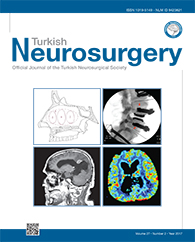2Maltepe University, Faculty of Medicine, Department of Neurosurgery, Istanbul, Turkey
3Maltepe University, Faculty of Medicine, Department of Neurology,Istanbul, Turkey
4Bahcesehir University, Faculty of Medicine, Department of Pathology, Istanbul, Turkey
5İstanbul Training and Research Hospital, Department of Neurosurgery, Istanbul, Turkey
6Sisli Etfal Training and Research Hospital, Department of Biochemistry, Istanbul, Turkey DOI : 10.5137/1019-5149.JTN.15079-15.1 AIM: The aim of this experimental study was to investigate whether spinal epidural 4% glucose polymer solution is effective in the prevention of postoperative fibrosis.
MATERIAL and METHODS: Twenty eight adult Wistar albino rats were randomly divided into two equal groups, including treatment and control. Both groups underwent L1 vertebral total laminectomy to expose the dura. Topical treatment group received 4% icodextrin. Four weeks later, epidural fibrosis was examined in both groups histologically, biochemically and macroscopically.
RESULTS: Topical use of 4% icodextrin prevented significantly epidural fibrosis following the laminectomy operation.
CONCLUSION: Topical 4% icodextrin application inhibits postoperative epidural fibrosis with various mechanisms and prevents adhesions by playing barrier role between tissue surfaces through flotation. Our study is first to present evidence of experimental epidural fibrosis prevention with 4% icodextrin.
Keywords : Epidural fibrosis, Icodextrin, Spine




